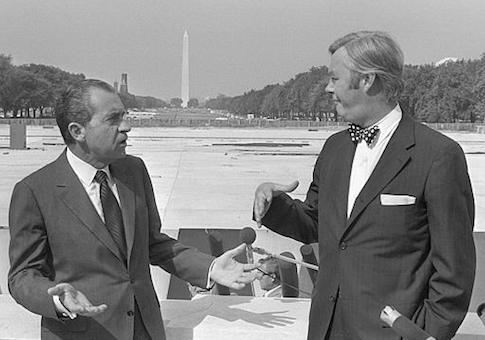Every now and again, when politics reaches an unbearable fever-pitch of idiocy, one is tempted to trade the eternal push and pull of democratic consensus for that perfect mixture of wisdom and power found in the person of Plato’s un-democratic Philosopher-King. Plato’s paradox—that the just, happy city will elude us until kings learn to philosophize or philosophers become kings—is meant to sober our expectations of earthly governance. If we set our sights somewhat lower, maybe the best to be hoped for are philosophers or the philosophically inclined to find their way to the halls of power, ready to serve those among the less wise who at least have the virtue of good listening skills. And this is really, in the final analysis, what the brilliantly conceived The Professor and the President is all about.
The professor is Daniel Patrick Moynihan; the president, Richard Nixon; and the chronicler of this inside account, Stephen Hess, who witnessed, from his vantage point in the office of Urban Affairs—where he acted as Moynihan’s deputy assistant—the playing out of a most peculiar relationship over the course of two years.
Hess’s account is told in "real time," beginning on December 10, 1968. At the time, Moynihan is an increasingly well-known Harvard academic, who "admits to being ‘distressed not to have any influence on anybody’ in Washington." He is also a Democrat, albeit one whose views on social policy, especially his infamous speech, "The Politics of Stability," have made him palatable to conservatives. Nixon is busy transitioning to a White House perch won with the narrowest of pluralities against Hubert Humphrey. Political intuition tells him it might be sensible to appoint a Democrat to the Cabinet and so he alights, with some persuading, on Moynihan.
During the courtship phase, it comes out that Moynihan wants to be part of Transportation, a position already promised to Republican governor of Massachusetts, John Volpe. He is asked to suggest something else: "Well, replies Pat, ‘I’d like to have the urban equivalent of Henry Kissinger’s job on the National Security Council. A National Urban Council or whatever the name will be." A position, Assistant to the President for Urban Affairs, is created, a perfect solution for Nixon whose interest in domestic policy has always been tepid, and Moynihan, whose ambition to guide the future of America, has piqued.
Nixon, used to monochromatic bureaucrats, begins to receive Moynihan’s memos: long, erudite missives, filled with arcane references and turns-of-phrase, and about things the scholar thinks the president ought to know (rather than the directive flowing the other way). As Hess notes:
Most staff memos to a president are essentially politician-to-politician or expert-to-CEO. But Pat is writing to Nixon intellectual-to-intellectual, without a bit of patronizing. Nixon has never been treated this way before. He loves it!
Later, Moynihan will grow comfortable enough with the president to begin suggesting books to fill in any intellectual lacunae. The list reads like a seminar in American politics at good liberal arts college: John Adams’s Autobiography; The Education of Henry Adams; Charnwood’s Abraham Lincoln, and so on. (Nixon, it turns out, had already read many of these volumes, though does not mind the suggestions.)
As much as Moynihan might have enjoyed philosophizing with the president, he took his appointment seriously, and to this end, kept his focus trained on pursuing and shaping domestic policy. Thanks to his provocations, Nixon establishes the Office of Child Development and the Commission on Population Growth and the American Future, two organizations whose raison d'être formed from Moynihan’s research into early childhood health and welfare and the coming "population bomb." But the professor is after bigger game. His "Moby Dick," says Hess, is the reform of the welfare system, which Moynihan hopes will vindicate his leaked (and much maligned) 1965 report, The Negro Family, on the state of black families in America.
He does not have to wait long. During a nationally televised speech on August 8, 1969, Nixon announces he "will abolish the present welfare system" and "adopt in its place a new family assistance system," which meant, more concretely, that poor families could be assured of receiving minimum incomes. In an interview with Bernard Asbell in The New York Times, a content Moynihan opens up:
I felt I was finally rid of a subject…Four—long—years of being called awful names…You know, the libs will never forgive him. Richard Nixon has now done the final, unforgivable thing to the liberals. He’s done what they wouldn’t do. This was the first Presidential message on welfare in history.
What tidings—welfare reform is finally on the national agenda thanks to a Republican administration! Jubilation is short-lived, however, thanks to the Family Assistance Plan’s death in the Senate Finance Committee. Weariness begins to take over Moynihan, whose family in Cambridge have been the recipients of death threats thanks to his proximity to a hawkish administration. More significantly, he is broke. Eventually resigning from the White House over disagreements with the president on the Vietnam War, Moynihan remains on strong terms with Nixon who, as he tended to reward loyalty, invites him to be ambassador to the United Nations. Citing financial strain, the professor declines and returns to Harvard, only to be appointed by Nixon a few years later—and this time he accepts—to an ambassadorship in India. Some time later, Moynihan will begin his two-decade career as the Senator from New York, receiving the Presidential Medal of Freedom in 2000 and dying three years later.
With the prospect of two individuals who are easily Nixon’s superior in corruption, though not, sadly, his intelligence, making it into the Oval Office this campaign season, Stephen Hess’ fine book is more needed than ever.
